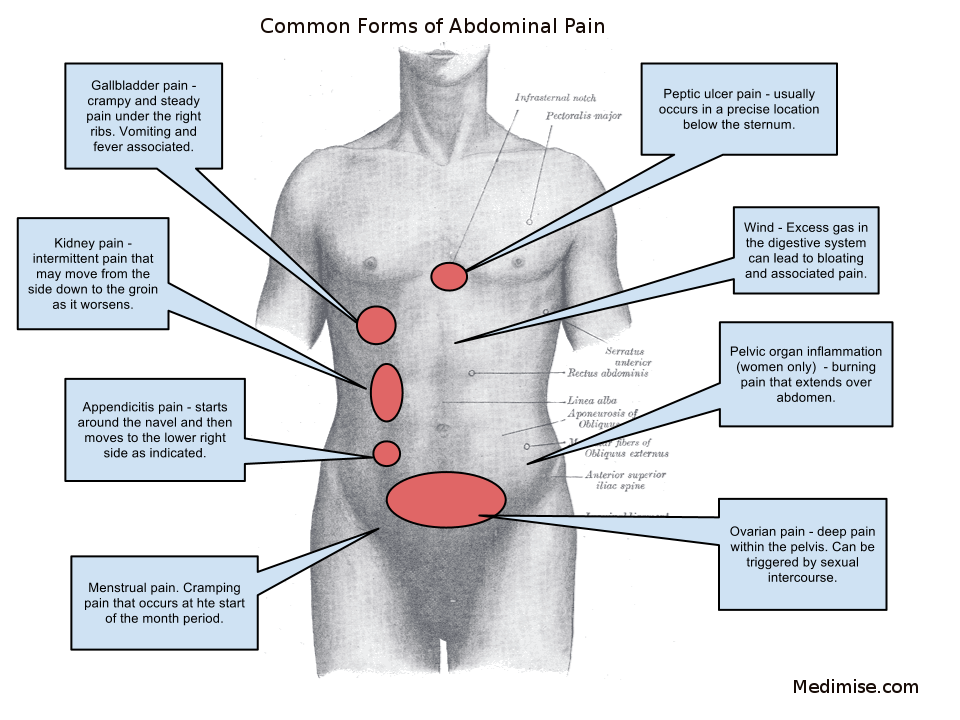(advertisement)
 Abdominal pain has many causes and symptoms can vary. The most common symptoms of andominal pain, aka stomach ache, are:
Abdominal pain has many causes and symptoms can vary. The most common symptoms of andominal pain, aka stomach ache, are:
- Frequent belching
- Nausea – feeling sick in the stomach
- Vomiting
- Rumbling, gurgling and generally an “upset stomach”
- Frequent flatulence (wind, farting)
Some abdominal pain from time to time is not uncommon. Most people will suffer from time to time, the main cause being from food poorly kept or prepared causing a mild bacterial infection of the digestive tract.
Common Forms of Abdominal Pain
These are the most common types of pain. Each can be located in the diagram above.
Gallbladder Pain
Crampy and steady pain under the right ribs. Vomiting and fever associated.
(advertisement)
Kidney pain
Intermittent pain that may move from the side down to the groin as it worsens.
Appendicitis pain
Starts around the navel and then moves to the lower right side as indicated.
Menstrual pain
Cramping pain that occurs at hte start of the month period.
Painful Wind
Excess gas in the digestive system can lead to bloating and associated pain.
Pelvic organ inflammation
Pelvic organ inflammation (women only) – burning pain that extends over abdomen.
Ovarian pain
A deep pain within the pelvis. Can be triggered by sexual intercourse.
(advertisement)
Pelvic and Lower Abdominal Pain
Women often suffer from pain in the lower abdomen during the menstrual cycle. The timing of the pain varies, it can be before or during a period, or during ovulation. There are some gynaecological disorders which cause the pain, such as endometriosis, which is relatively rare condition where fragments of the uterine lining appear in abnormal sites in the abdomen. However, for most women there is no specific medical cause.
Cystitis – Inflammation of the Bladder
Cystitis, an infection that causes the inflammation of the bladder, is a common cause for lower abdominal pain. Symptoms of cystitis generally include;
- Desire to urinate more often
- Pain and / or stinging when urinating.
When Should You See a Doctor about Cystitis?
Children and men area advised to see a doctor immediately if they have symptoms, as the condition is generally much worse in children and men and may also be a sign of a more serious underlying problem. Women should see a doctor the first time that they suffer from cystitis, but self-treat thereafter. Unless they suffer more than 3 times a year, in which case they should seek medical advice.
The body usually recovered from cystitis without any medication after 4-9 days, however, in more severe cases a course of antibiotics may be needed.
Treatment for Cystitis
The best treatment is to drink plenty of water to help the body flush out bacteria from the bladder. Painkillers can help manage the condition. Paracetamol to reduce pain when urinating and ibuprofen to reduce inflammation.
Cranberry juice is a popular preventative treatment and cure for cystitis.
Do not ignore bladder pain as untreated bladder infections may lead to more serious kidney infections.
Abdominal Colic
Abdominal Colic is when a muscle goes into spasm resulting in painful episodes every few minutes. The pain may start in the bile ducts, intestine, ureters or uterus. Colic is the body’s response to an obstruction – the violent muscular spasms are an attempt to dislodge something. The same pain is felt in cases of severe food poisoning when the bowels are trying to forcibly empty themselves.
Causes of abdominal colic can include stones, tumours or inflammation – the body may not be able to differentiate inflammation from a foreign body causing a blockage. In severe cases it can lead to vomiting.
Peptic Ulcers
Peptic Ulcers form when too much stomach acid is produced. These cause gnawing pains. Relief is often seen after eating, drinking milk or taking an antacid, but the pain will return once the food or antacids have passed through. Peptic ulcer pain usually occurs in a precise location below the sternum.
Infection and Food Poisoning
Infection is a common cause of belly ache. Infection can strike many organs, including the kidneys (pyelonephritis) and the female reproductive system (pelvic inflammatory disease).
Twisted Intestine
If the intestine becomes twisted there can be a reduction in blood flow. This will often lead to pain. The twisting of the intestine is called a volculus, and the shortage of blood called ischaemia. Blood clots in the intestinal blood vessels can also result in abdominal pain.
Psychological Pain – Anxiety
People under a lot of stress or suffering from anxiety can suffer from abdominal pain. Starting a new job, first day at school or competing in a major competition – they can all lead to abdominal pain. Butterflies in your tummy can hurt!
Treatment
Treatment obviously varies considerably. Mild acute pain is often treated with rest, healthy eating and a good night’s sleep. Some people recover after taking an antacid, others by using a hot water bottle.
If the pain is not associated with vomiting and lasts for more than 6 hours it is advisable to consult a doctor who will examine you to determine the cause. If the pain is accompanied with fever, sweating, faintness or dizziness, then you should also seek medical assistance.
If you vomit blood or your stools are black / bloody then you should seek urgent medical assistance. Also any unexplained, rapid weight loss should also be followed up with a trip to the doctor.
(advertisement)

